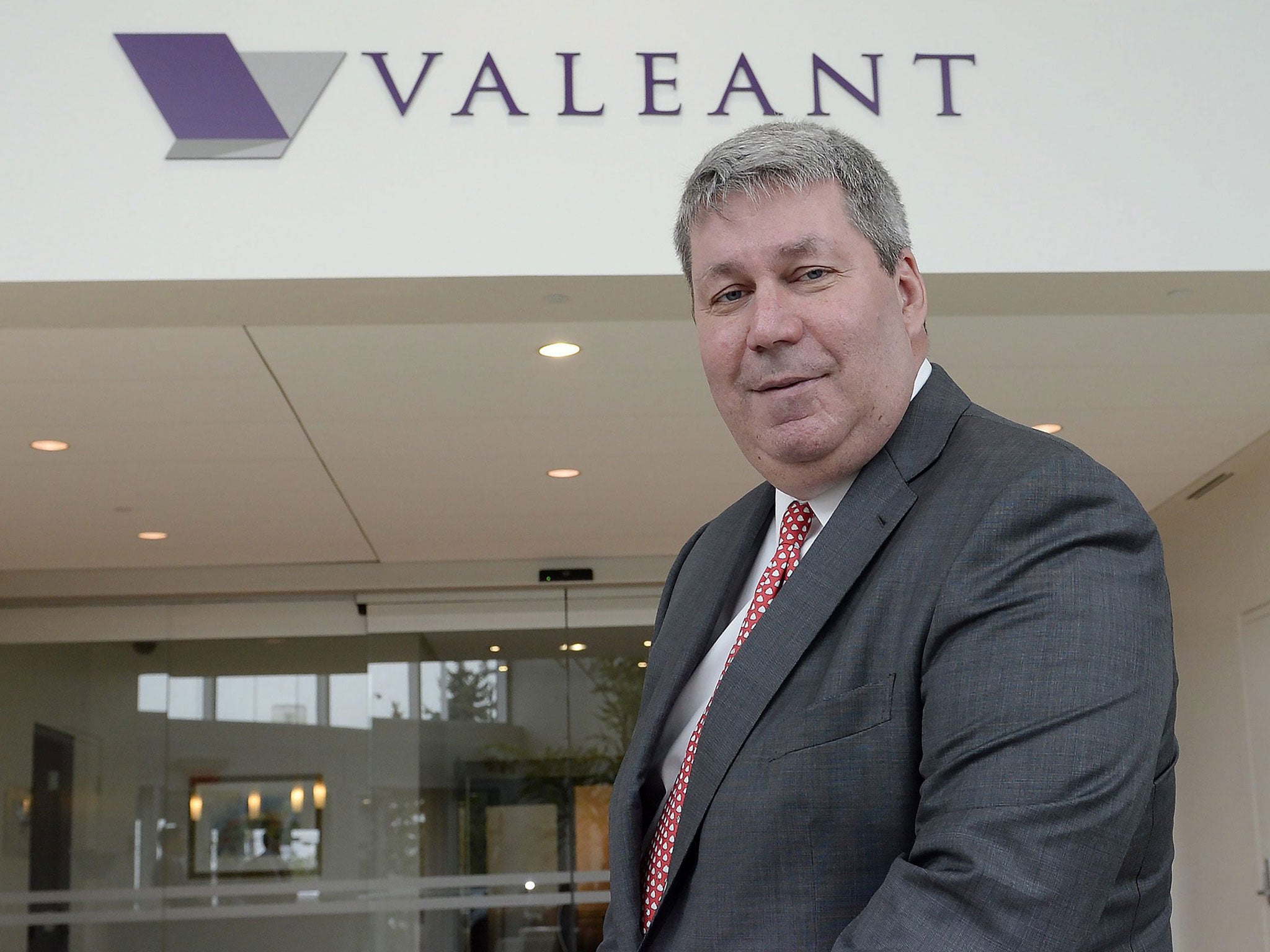US regulators attempt to shame drug firms like Valeant
US Outlook

Your support helps us to tell the story
From reproductive rights to climate change to Big Tech, The Independent is on the ground when the story is developing. Whether it's investigating the financials of Elon Musk's pro-Trump PAC or producing our latest documentary, 'The A Word', which shines a light on the American women fighting for reproductive rights, we know how important it is to parse out the facts from the messaging.
At such a critical moment in US history, we need reporters on the ground. Your donation allows us to keep sending journalists to speak to both sides of the story.
The Independent is trusted by Americans across the entire political spectrum. And unlike many other quality news outlets, we choose not to lock Americans out of our reporting and analysis with paywalls. We believe quality journalism should be available to everyone, paid for by those who can afford it.
Your support makes all the difference.There’s an old and not very funny story about how drugs are priced: put a gang of pharmaceutical marketing people in a room and whoever can come up with the highest price without making the rest of the room laugh wins. It’s a particularly unfunny story on this side of the pond right now.
Federal attorneys have begun an investigation into pricing practices at a handful of generic drug manufacturers – most notably Valeant Pharmaceuticals International – with subpoenas being sent out this week. It’s a disgrace it took so long. After all, sky-high drug prices and millions of patients brainwashed by the prospect of staying alive are what have made the American healthcare market a pharmaceutical goldmine.
Valeant is one of a new breed of drug companies, which have been accused of cutting real research and development in favour of buying old, off-patent generic drugs and then upping the price by several hundred per cent. This can be done because, as a result of their age and relatively low demand, many older generics have no competition. It’s a great business model, so long as you aren’t bothered by such trivialities as ethics or morality.
To be clear, there is nothing wrong with pharmaceutical companies seeking a profit. Discovery, trials and regulations cost a lot of money. Patents and the fixed-term monopolies they create are the reward.
However, buying the rights to a generic drug on which someone else did the legwork years ago, and then jacking up the price, is not the same thing. Increasing prices takes advantage of patients who may have no other choice, unless they consider death a viable alternative.
The poster child for drug-price spiking is Martin Shkreli, the loathsome chief executive of Turing Pharmaceuticals. Earlier this year his company bought the rights to a drug called Daraprim, used to treat a common parasite that can be fatal in patients with compromised immune systems (most notably those being treated for HIV and cancer). He raised the price of the drug from $13.50 (£8.75) per pill to $750 overnight.
Not to be put off by his status as public persona non grata, Mr Shkreli said this week in an interview with the website Business Insider. “Until we figure out demand,” he said, “we won’t lower the price.”
This is a drug that has been around for more than 60 years and is used in very specific patients over a very long period. It is absurd to think that the company is only now “figuring out” demand.
However, if the wretched Mr Shkreli is the poster child for this ugly new business model, Valeant’s chief executive, J Michael Pearson, is its father figure. Valeant has substantially raised the price on numerous drugs it has acquired: Glumetza, a diabetes treatment, went up by 1,020 per cent; Cuprimine, used to treat Wilson’s disease, increased in price by 2,850 per cent; and the heart-rate drug Isuprel went up by 720 per cent, according to AB Bernstein. That’s just scratching the surface at a company that has bought at least 100 drugs since the former management consultant Mr Pearson took the helm in 2008.
The irony is that as a Canadian company, the largest on the Toronto Stock Exchange, Valeant can’t engage in such practices in Canada, where there are federal and provincial controls on what drug groups can charge Canadians. By contrast, Valeant can brazenly give Americans an ultimatum.
The acquisition-happy Valeant tried to buy its rival Allergan for $45bn in 2014 – a bid the latter’s board rejected in unusually forceful language: “The Valeant business model is not sustainable.”
Despite their repulsive behaviour on pricing, however, it’s hard to see how Valeant or Turing have actually broken US laws. The drugs rights were sold on the open market to the highest bidders; depressing though it is, what they then do with the pricing is up to them – ethics and morality be damned.
So perhaps the aim of the investigations in New York and Massachusetts is to publicly shame these companies into cutting their prices, rather than to convict them of any wrongdoing. Which is fine by me, and should be fine by every American. And if there is any decency left in the drugs industry, Valeant’s business model will not be sustainable for much longer.
Join our commenting forum
Join thought-provoking conversations, follow other Independent readers and see their replies
Comments